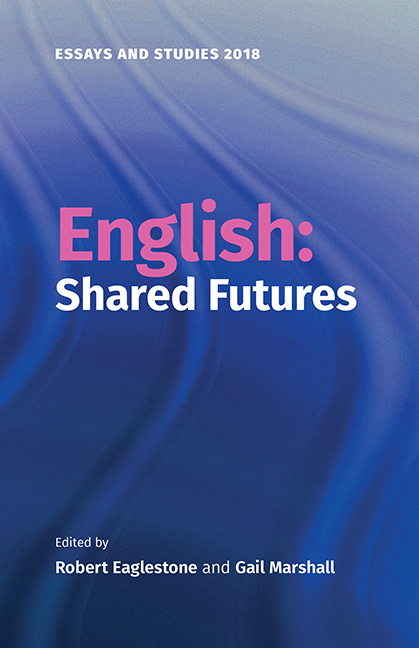Book contents
- Frontmatter
- Contents
- Notes on Contributors
- Acknowledgements
- Abbreviations
- Introduction
- The Changing Picture of School English
- From A-Level to HE: Working Towards a Shared Future?
- English Outreach: Academics in the Classroom
- From Provider to Stager: The Future of Teaching English in HE
- Pedagogic Criticism: An Introduction
- Exquisite Tensions – Narrating the BAME ECA Experience
- Postgraduate Futures: Voices and Views
- Shared Futures: Early Career Academics in English Studies
- Some Reflections on the Funding of English Departments
- English: The Future of Publishing
- Digital Futures
- A View from the United States: The Crisis in the Humanities; the Liberal Arts; and English in the Military Academy
- The Future of Borders
- ‘Between and Across Languages’: Writing in Scotland and Wales
- Exploring Intersections between Creative and Critical Writing: An Interview with Elleke Boehmer
- Integrating English
- Employability in English Studies
- Creative Living: How Creative Writing Courses Help to Prepare for Life-long Careers
- Practice at Large: How Creative Writing can Enhance University Research Environments
- ‘And who can turn away?’ Witnessing a Shared Dystopia
- English and the Public Good
- ‘Can Wisdom be put in a silver rod? / Or Love in a golden bowl?’ On Not Defending the Humanities
- ‘Something Real to Carry Home When Day Is Done’: The Reader in Future
- Afterword
- Index
English: The Future of Publishing
Published online by Cambridge University Press: 15 October 2019
- Frontmatter
- Contents
- Notes on Contributors
- Acknowledgements
- Abbreviations
- Introduction
- The Changing Picture of School English
- From A-Level to HE: Working Towards a Shared Future?
- English Outreach: Academics in the Classroom
- From Provider to Stager: The Future of Teaching English in HE
- Pedagogic Criticism: An Introduction
- Exquisite Tensions – Narrating the BAME ECA Experience
- Postgraduate Futures: Voices and Views
- Shared Futures: Early Career Academics in English Studies
- Some Reflections on the Funding of English Departments
- English: The Future of Publishing
- Digital Futures
- A View from the United States: The Crisis in the Humanities; the Liberal Arts; and English in the Military Academy
- The Future of Borders
- ‘Between and Across Languages’: Writing in Scotland and Wales
- Exploring Intersections between Creative and Critical Writing: An Interview with Elleke Boehmer
- Integrating English
- Employability in English Studies
- Creative Living: How Creative Writing Courses Help to Prepare for Life-long Careers
- Practice at Large: How Creative Writing can Enhance University Research Environments
- ‘And who can turn away?’ Witnessing a Shared Dystopia
- English and the Public Good
- ‘Can Wisdom be put in a silver rod? / Or Love in a golden bowl?’ On Not Defending the Humanities
- ‘Something Real to Carry Home When Day Is Done’: The Reader in Future
- Afterword
- Index
Summary
Katherine Baxter, Journal Publishing
When it comes to editing journals, the advice available is plentiful. A quick search for recent reports on the experience of journal editing discovers a striking similarity in the experiences they discuss. Editors of academic journals in disciplines ranging from medical science to geography tend to refer to and reflect on the same basic challenges and rewards. These follow directly from the main activities of the journal editor. For most editors, the primary remit of a journal is to publish excellent, timely and original research that is relevant and accessible to its audience. Many journals also include commentary on recent published research in the form of review essays and state-of-the-field surveys, and some include other kinds of material such as editorials, roundtables, original creative work (whether visual or verbal), obituaries, and so on. Nonetheless, the main purpose of most academic journals is to provide a venue for supporting and showcasing new scholarship. In what follows I consider some of the common issues noted by journal editors, before exploring the impact and potential of Open Access and digital media for the landscape of journal publishing.
To publish scholarship one must receive it first, and many editors reflect on the challenges of encouraging plentiful, high-quality submissions. Once material comes in the next step is to find willing and competent reviewers. As the competing pressures on academics’ time increase, many scholars can struggle to find the time or the will to undertake what is usually uncompensated and invisible work. And this leads to the final shared woe among academic editors the world over: institutional support. Although universities are usually happy to provide a nominal home for a scholarly journal, the realities of institutional support are frequently meagre unless the journal in question comes with a major stipend or reputational kudos. Ian Hay sums up this situation concisely:
Given the key role of editing in the maintenance of academic standards, it is deeply ironic that as the need for astute and erudite editors grows, so have some of the institutional barriers to participation intensified, depriving aspirants from some of the fulfilling personal and professional opportunities editing offers.
- Type
- Chapter
- Information
- English: Shared Futures , pp. 83 - 99Publisher: Boydell & BrewerPrint publication year: 2018

